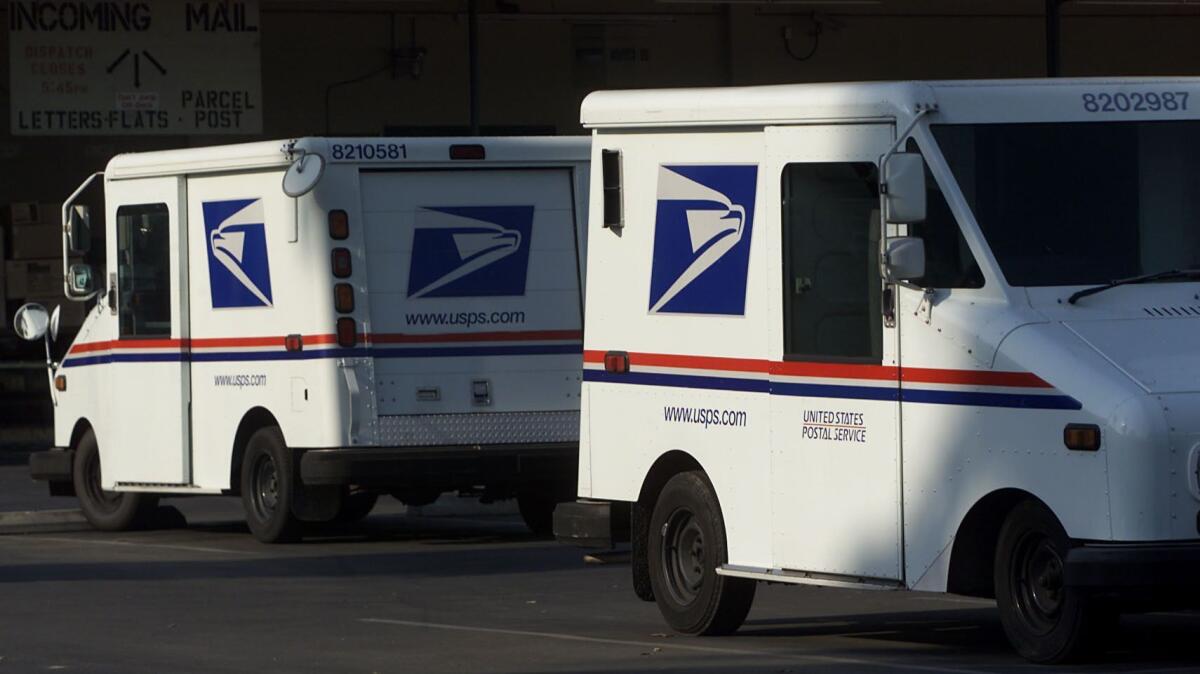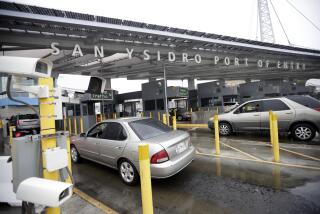Postal workers took bribes as low as $250 to deliver cocaine; now they’ll be jailed 3 to 9 years

- Share via
They deliver your most fragile parcels. They arrive at your doorstep with the most intimate letters from loved ones.
They are U.S. Postal Service workers.
But in the Atlanta area, they also have been handling a precious commodity of a different sort: cocaine.
Sixteen letter carriers and clerks accepted bribes for as little as $250 to transport 2 kilograms or more of the contraband at a time, according to the U.S. Attorney’s Office for the Northern District of Georgia, which began probing their activities in 2015. For that bargain, they received sentences of three to nine years in federal prison, with the final defendant sentenced on Tuesday.
“Postal employees are paid to deliver mail, not drugs,” Imari Niles, a special agent with the U.S. Postal Service Office of Inspector General, said in a news release.
Chris Hacker, an agent with the Federal Bureau of Investigation’s Atlanta field office, called the scheme a “blatant abuse of the public trust” and said it “stains the reputation of all U.S. Postal Service employees.” The felonious arrangements also endangered the residents on the postal routes served by the employees, he said, by bringing drugs into their communities.
The Postal Service, which touts itself as the most trusted government agency, has also become a trusted delivery mechanism for drug traffickers. A report released in September by the Postal Service Office of Inspector General found that U.S. mail was a highly effective and low-risk means of getting drugs to buyers.
One cocaine trafficker, the report said, claimed to have used the service to make nearly 4,000 shipments, reporting a 100% delivery rate. The system is so trusted by dealers that nearly half of the 96 traffickers identified by the inspector general’s report “offered free, partial, or full reshipment if the package did not arrive to the buyer’s address because it was confiscated, stolen, or lost.”
Regulations limiting the ability of postal inspectors to open and inspect parcels have made the transmission of drugs through the mail relatively common, the report warned.
More rare, however, is the case of postal workers actively facilitating the trade.
Here’s how the postal workers in Atlanta were busted, according to federal prosecutors.
In 2015, federal agents tasked with slowing the drug trade in Atlanta learned that traffickers were relying on a new way to circulate their supplies covertly. They were bribing postal workers to intercept and hand-deliver packages of drugs during the course of their regular distribution, which took them not just to the city’s bustling downtown but also through residential neighborhoods in metro Atlanta.
Agents enlisted a confidential source to pose as a drug trafficker on the lookout for postal workers to convey kilograms of cocaine and marijuana. The faux trafficker found many willing partners, who agreed to deliver the parcels and haggled over their compensation. Agents watched from afar, recording the interactions.
Each of the defendants identified by the undercover source chose to deliver cocaine rather than marijuana because they believed the more illicit drug would merit a higher bribe. When the source asked them to suggest additional postal workers for the scheme, some introduced the confidential emissary to co-workers interested in participating — and then claimed a bonus for each parcel transmitted by their recruit.
The defendants ranged in age from 26 to 64. In addition to prison time, they were slapped with financial penalties as high as $10,500. An additional defendant, who was not a postal employee but helped facilitate the deliveries, was ordered to pay $10,700, in addition to a nine-year prison sentence.
The final defendant sentenced this week was Leea Janel Holt, 39, of Atlanta. A letter carrier assigned to the Old National Branch of the Riverdale Post Office, Holt was sentenced to 6 1/2 years in prison.
The Postal Service handles 47% of spherical mail and delivers hundreds of millions of private carriers’ ground packages, according to the inspector general’s report, which was requested by Sen. Claire McCaskill (D-Mo.). The Internet has dramatically expanded the availability of illicit drugs by offering traffickers and their buyers a degree of anonymity that had once been impossible, the report said.
Each incident of drugs shipped in the mail, the oversight officer cautioned, “erodes the public’s trust in the postal system.”
Seizures by the Postal Inspection Service are on the rise. More than 40,000 pounds were recovered last year, according to an annual report, while border agents seized nearly 1,500 pounds of fentanyl alone in 2017.
Lawmakers on Capitol Hill are trying to make it easier for the Postal Service to guard against opioids arriving in the U.S. through international packages.
But the inspector general warned that the agency was hamstrung by constitutional limits and postal regulations. Similar procedures don’t apply to private carriers, “because they enter into individual contracts with their customers that include a stipulation allowing them to open and inspect packages at any time.”
“Criminals realize this and prefer to use the Postal Service for this reason,” the report warned.
More to Read
Sign up for Essential California
The most important California stories and recommendations in your inbox every morning.
You may occasionally receive promotional content from the Los Angeles Times.










